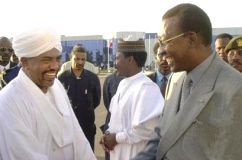Sudan, Chad agree to bolster peace deal
Feb 21, 2007 (TRIPOLI) — Sudan and Chad agreed on Wednesday to strengthen implementation of an existing deal to end the violence that has spilled over from Darfur onto their borders, a Sudanese presidential adviser said.

|
|
Idriss Deby meets with Omer el-Bashir, in Khartoum, on Wednesday, December 10, 2003. |
Majzoub Al-Khalifa, an adviser to Sudan’s President Omar Hassan al-Bashir, told reporters the agreement was struck at a meeting of the leaders of Sudan, Chad, Libya and Eritrea that sought to end violence in Sudan’s Darfur region.
“What came out of this meeting is the normalisation of relations between Sudan and Chad and enhancement of the implementation of the previous Tripoli Agreement and the return of normal life to both countries,” said Khalifa.
He said “mechanisms of observation” would be set up to monitor any attempt to smuggle weapons across the frontier.
Violence in Darfur has expanded into Chad, which accuses Sudan of supporting rebels launching cross-border attacks that have exacerbated ethnic tensions and triggered a flood of refugees.
Libyan leader Muammar Gaddafi has been pressing Chad and Sudan to settle their differences as part of international efforts to bring peace to Darfur.
In February 2006, Sudan’s Bashir and Chad President Idriss Deby agreed to end the crisis in the so-called Tripoli Agreement requiring they stop insurgents setting up bases on their territories and end propaganda against one another.
In November 2006 they pledged to redouble efforts to repair their frayed ties.
Chad continued to accuse Sudan of sending Janjaweed militia across the frontier and of arming and directing rebels trying to overthrow Deby. Sudan’s government denies this.
TACKLING CONFLICT
Wednesday’s attempt to mend the Sudan-Chad rift was part of a wider effort by Gaddafi to tackle the Darfur conflict, scene of one of the world’s worst humanitarian crises with an estimated 200,000 people killed and 2.5 million driven from homes since 2003.
The meeting, which also included Eritrean leader Isaias Afewerki, had been aimed at enticing the National Redemption Front rebel coalition to join a 2006 peace deal between Khartoum and a faction of the former rebel Sudan Liberation Movement.
Divisions among Darfur’s rebel factions have been a factor in delaying an effective peace deal with Khartoum. One of the main factions complained on Wednesday it had not been invited to the talks in Libya and dismissed them as a “charade”.
The spiral of violence in Darfur has been slowed only by a huge humanitarian operation, which aid workers warn is increasingly under threat.
Washington calls the violence genocide, a term European governments are reluctant to use and which Khartoum rejects.
Bashir has resisted pressure to authorise deployment of thousands of U.N. peacekeepers to support a 7,000-strong African Union mission in Darfur.
(Reuters)
